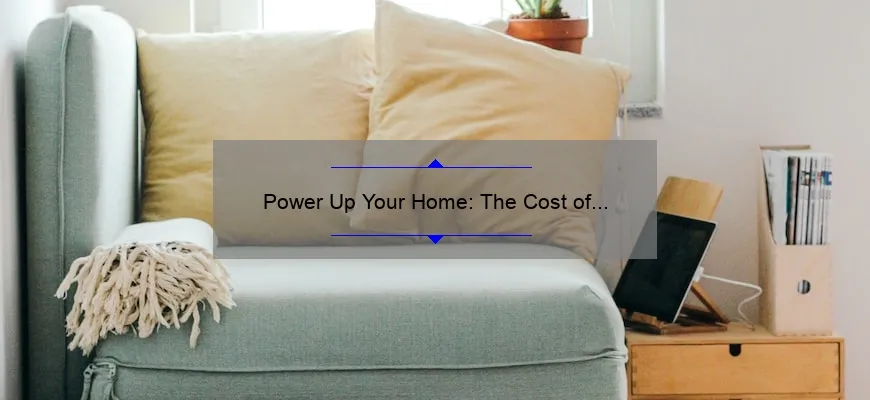Short answer how much to hook up a generator to your house:
The cost of hooking up a generator to your house can vary greatly depending on factors like the type of generator, the size of your home, and the complexity of the installation. However, on average, homeowners can expect to spend anywhere from $500-$10,000 for a professional installation. It’s important to obtain quotes from licensed electricians before proceeding with any work.
Step-by-Step: How Much Does It Cost to Hook Up a Generator to Your House?
A generator can be a lifesaver during power outages, but getting it hooked up to your home’s electrical system is not always an easy task. Not only do you need to consider the cost of the generator itself, but also the installation and any necessary upgrades to your home’s electrical system.
Here’s a step-by-step guide on how much it costs to hook up a generator to your house:
1. Choose Your Generator
Before you can estimate the total cost of installing a generator in your home, you’ll need to choose which type of generator best suits your needs. There are two primary types: portable generators and standby generators. Portable units are less expensive than their standby counterparts, but they require manual operation and must be connected manually every time there’s an outage.
Standby generators, however, run automatically whenever power goes out and come with higher price tags (more on this later). They are more convenient as they don’t require human involvement and offer greater electrical outputs for all household appliances such as air conditioning or large entertainment systems without interruption.
Portable generators range from $300–$2,000 depending upon wattage output while standby units start at $5k+ which includes standard installer fees (labor &complicated mechanical installations).
3.Installation Costs
The precise amount that families spend when purchasing a backup generator depends heavily on the size and model chosen for installation.
After deciding whether or not to invest in either continuous generation electricity through automatic-transfer switches(ATS) or renting smaller devices commonly utilized after severe weather events like tropical storms/hurricanes – owners will begin looking further into expenses associated with permits required by local regulations experts who handle construction wiring protocols regulation per locale protocol; including oil tanks if condensing seems preferable long-term for efficiency potential plus alternative options roofing/structural reinforcement treatments insurance policies protecting property values etc…
4.Required Supplying System Professional Set-ups
Once family has settled on particular brand/model preferences beyond standby/current option, it’s time to focus on the more technical aspects of generator ownership.
Sizing here is key when it comes down into consideration. It’s best and most important for each household separately since electrical requirements can differ substantially between households depending their appliances needs and air conditioning capability driven by a small or large electricity supply at any given moment. Additional, critical expenses involve transferring power through an ATS device which automatically sets up units controlled by internal sensors/relays that transfers power directly from your backup source directly back-upping home settings in order prevent damage provoked electricity fluctuations or harmful fail-safes
5.Total Costs
After calculating all necessary costs needed towards installation permits , transfer switches plus labor charges required finding out if code regulations laws require professional liability coverage choosing preferred brand/model everything taken account could range before taxes attaining near $12k providing exceptional electrical services warrantied years ahead covering unforeseen damages/repairs no matter what kind .
In conclusion purchasing generators seems like straightforward expense however hidden complexities always awaiting from planning system set-ups(AC Capacity) to additional upgrades(roofing +structural enhancements). Ultimately, families facing fierce weather conditions will recognize real cost-saving protection this provides during potentially perilous times while also valuating prevention protocols safe-guarding personal welfare.
FAQ: How Much Should You Expect to Pay for Connecting a Generator to Your Home?
As a homeowner, investing in a generator can be an excellent way to ensure that your family is prepared for power outages. There are numerous benefits to having a generator connected to your home, including providing critical backup power during emergencies and allowing you to maintain the comfort and safety of your household.
However, one question that many homeowners grapple with when considering installing a generator is how much they should expect to pay for connecting it to their house. The truth is, there’s no single answer as the cost will depend on several factors such as:
1) Type of Generator: The type of generator you purchase will influence the price you have to pay for installation services. A portable generator will offer lower initial costs but requires manual set up every time there’s an outage while standby generators require more money upfront compared to portable ones.
2) Power Capacity: Based on the size and capacity needed, generators vary significantly regarding pricing since larger wattage models generally equate higher price tags.
3) Distance from Home Electrical Panel:Connecting the generator close necessarily means less wiring required which translates into reduced labor prices
4) Local Regulations – Depending on location some regions may need specific permits before starting any electrical project or hire only licensed contractors which would affect installation expenses incurred by homeowners looking into getting new Generators at home.
On average though estimates indicate that individuals can expect installation prices ranging from $5000–$10 000 depending on different variables.
Final Words,
The bottom line Is Installing a reliable Backup Generator system for emergency purposes may seem like quite an investment altogether however in terms of stability and convenience its worth what charges occur if implemented by experts professionally guided through each step ensuring long-lasting functionality tailored upon exclusive requirements with high tech features designed specifically suiting unique demographic needs resulting in greater equipment efficiency along minimal maintenance cost thereby removing any anxiety and doubts around blackouts because nothing beats being comfortable in your own space & not worrying about electricity usage impact affecting normal daily life routine with family members.
Top 5 Facts About the Expenses of Connecting A Generator to Your Home
As a homeowner, there are several advantages to having a generator connected to your home. Not only does it provide an additional source of power during times of outages or emergencies, but it also adds value to your property. However, connecting a generator to your home requires proper planning and investment. In this blog post, we’ll discuss the top 5 facts about the expenses of connecting a generator to your home.
1. The cost of the generator
The first expense incurred when considering connection costs for a generator is the device itself. There are many different types and sizes available on the market, ranging from portable units that can be taken anywhere you need backup power, all the way up to permanent standby generators that will provide uninterrupted electricity indefinitely.
It’s essential that you choose one with sufficient wattage capacity suitable for powering appliances in your house rather than going for one which cannot run necessary appliances like air conditioners among others.
2. Permitting fees
Before installing any type of electrical equipment permanently on your property (like too permanently install circuits), most municipalities require permits before proceeding with installation Authorized electricians should acquire these such as Connection Fees after approving building plans while enjoying professional services Meeting these requirements come at an added expense since you must pay legal authorization fees according regulations imposed in different regions’ respective local cul de sacs—prior research helps obtain adequate information concerning; how significant fees vary regionally?
3. Equipment and materials required for installation
Proper installation requires not just hooking up cables between devices then Voila! With installations comes extra equipment purchases needed critically by professionals who help connect professionally installed coils correctly inside input wiring into each appliance block box initiating transfer switch functionalities together safely both online simultaneously minus cable overload damages since more current flows uninterruptedly once operational efficiency features employed enabling smooth running operations within residential walls without hitches throughout seasons annually every time desired Some common utilities used include assembly hoses & pipes required in excess when attaching conduit stabilizing legs or braces with screws brackets alongside mounting hardware all purchased within regulations.
4. Labor costs
Assembling said essential items come at a price, namely hiring skilled technicians who offer services of connecting your generator to the home circuitry annually. The total sum depends on how many devices need connection and approximately spent time for them getting installed within predetermined approved rates according to regionally accepted practices Customarily, though average prices range between 800-2000 dollars per installation under normal circumstances without complications requiring additional attention by professionals that would normally account for higher expenses than usually estimated cost which varies from one project another depending duration taken completing projects successfully; less could be same as more based job requirements while paying up usual hourly charges put fixed payment periods against estimating overtime fees eventually tacked onto bills after final settlements achieved.
5. Maintenance and running costs
Once the generator is installed & connected correctly professional expect regular maintenance since good care during operation assures durability plus reliability hence indirectly impacting owners thus reducing incidental electricity downtime disparities occurring intermittently around neighborhoods or power outages elsewhere across cities Following best utility guidance manuals provides ample knowledge concerning efficient recondition solutions ensuring proper usage longevity besides saving repair actualization amounts necessary where essential replacements are required except integrated warranty provisions catered initially altogether covering wear tear prone parts faulty manufacture supplies also listed all upcoming year’s machinery repairs during operations apart from contract extended service agreement warranties in case mishaps arise following installations procedures previously adhered adequately by renowned experts certified go-to consultants when offering such services domestically anywhere globally wherever built residencies continuing industry trends worldwide particularly in Electrical Engineering (widely adopted paradigm).
Connecting a generator to your home can bring peace of mind during emergency blackouts but it is no small investment. By understanding these five facts about expenses associated with connections whether newly established premises or upgrade an older system, you will have clear expectations regarding what goes into installing standby generators followed through professionally trained workers instead risking accidents due poor amateurish handling Unauthorized personnel not experienced in Electrical setups can result fatal damages aside costly equipment bills incurred when faulty execution prospects fail. It is always wise having well-vetted professionals first do thorough inspections then suggest appropriate specifications or alterations as necessary depending on individual premises’ wiring installations existing before beginning such investments seriously plus professional guidance by the Department of Energy minimizing damage costs whenever handling emergencies hastening waiting periods reducing electricity inefficiencies inevitably observed throughout regular daily programming around households everywhere globally today and tomorrow’s energy generation centers seeking radiant futures power solutions worldwide whatsoever conditions may arise digitally ready for 21st century innovations faster connectivity speeds efficiency regulations, safety needs advanced; generator connection technologies nationwide are quickly becoming essential modern-day living necessities grown out convenience an increasing shift towards more reliable utilities destined be technological leaders within privately owned properties without government subsidies striving become catalytic pioneers any given trend thereafter constantly innovating upon experiencing industry disruptions thus leading multitudes strategic directed electric engineering measures both personally scalable thereby fueling economies families across various sectors wayforward…

